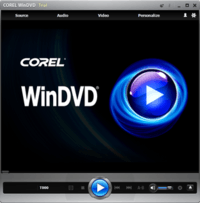WinDVD
WinDVD (owned by Corel Corporation which bought InterVideo in 2006[3]) is a commercial video player and music player software for Microsoft Windows. It enables the viewing of DVD-Video movies on the user's PC. DVD-Video backups stored on hard disk (created using software such as DVD Decrypter) can also be played. The player can also be used to play videos and audio/music files in other formats encoded with different codecs, for instance DivX, Xvid, Windows Media Video video and MP3 and AAC audio. Newer versions also support full Blu-ray Disc and HD DVD (HD DVD support removed after WinDVD 9) playback with menus, with CPRM DRM support.
 WinDVD 9 | |
| Developer(s) | Corel |
|---|---|
| Initial release | 1998 |
| Stable release | WinDVD Pro 12 Service Pack 6 (January 21, 2020[1][2]) [±] |
| Preview release | none [±] |
| Operating system | Windows |
| Type | Video Player |
| License | Proprietary |
| Website | Corel InterVideo Page |
Features and Functions
Special features and functions supported by InterVideo WinDVD version 8.0 during video/movie and audio/music playback.
- Supported video formats/codecs: MPEG-1, MPEG-2 (including HD support), MPEG-TS, DVD-Video, MiniDVD, MPEG-4 ASP (like Xvid and DivX, including DivX Pro), H.264/MPEG-4 AVC, VC-1, WMV HD, DVD-VR, DVD+VR, 3GPP and 3GPP2, QuickTime, RealMedia/RealVideo
- Supported audio formats/codecs: WAV, MP3, AAC, LPCM, MLP Lossless, Dolby Digital (5.1) and Dolby Digital (2.0), Dolby Digital EX, DTS 2.0 and 5.1, DTS Neo:6, DTS 96/24, DTS-ES Discrete, RealMedia/RealAudio
Video Playback
- TrimensionDNM - interpolates frames to give smooth playback
- Smooth Reverse Playback - smooth reverse/rewind playback without dropping frames
- Video Desktop - display subpanel to let the movie play in the background, just like a Windows wallpaper
- Software Video Deinterlacing - ensures a smoother and clearer video image on progressive displays
- Dynamic range compression and SRS - offers modes suited to Quiet, Noisy and Normal listening environments
- Instant Replay - Jump back to the line you missed, or catch that action sequence again
- "Boss Key" - One click hides the player out of the way from the desktop
- 9X Digital Zoom
- Closed captioning support provides closed captioning for the deaf and hard of hearing
- Video Bookmarks enable quick access to a user's favorite movie scenes
- Saved as a file with ".bmk" extension for later use or export for use on another computer
- Resume playback - allows users to play a DVD from the last scene prior to stopping
- Screen snapshots can be captured with a user-defined aspect ratio
- External subtitle support allows playback via AVI, DivX and WMV files
- On-screen display (OSD) lets users define where video information is located
- Color Themes lets users personalize the look of your player to match their mood or their desktop
- Low Frequency Effects (LFE) mixes the LFE channel (bass) with front speaker channels
- Dolby Pro Logic IIx - 2.0 - 5.1 => 7.1 audio-channels expansion technology (upsample anything from 2.0 to 7.1 surround sound)
- Dolby Headphone - Virtual surround sound on 2-channel (stereo) headphones
Music Playback
- Dynamic range compression and SRS - offers modes that give better bass tones of your music
General Features
- Playlist playback and creation support - for audio or video files from DVDs, VCDs, SVCDs and CDs
- "Movie Encyclopedia" is a new feature of WinDVD that enables users to access a movie database for details on movies, actors and directors, (similar to IMDb).
- UPnP Control Point (UPnP-client) - Play videos from any UPnP AV MediaServer device in your home network
- UPnP UPnP AV MediaServer (UPnP-server) - allows other UPnP Control Point devices in your home network to stream audio/video files from WinDVD